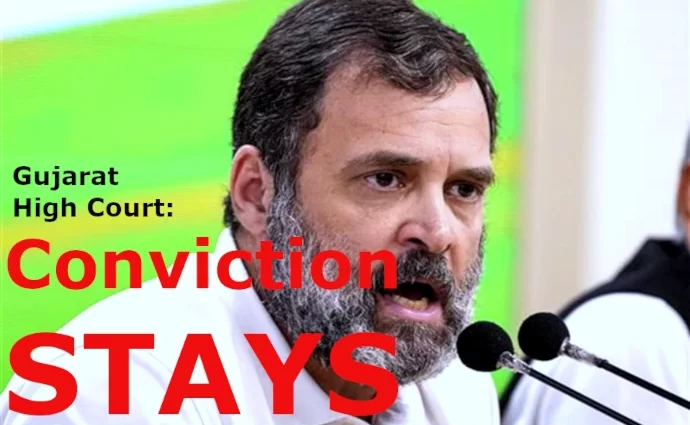The Gujarat High Court has delivered its verdict and dealt a political death blow to the Congress leader Rahul Gandhi.
The court refused to stay his conviction and two-year jail term in a criminal defamation case, which had led to his loss of the Parliament membership.
Citing jurisprudence, the court ruled that granting a stay on conviction is an exception and not a rule.
Speaking at a rally during the 2019 Lok Sabha election campaign, Rahul Gandhi had, in a very matter of fact manner, commented, “how come all thieves have the common surname Modi,” which was taken as defamatory by the Modi community and an MLA of the Gujarat Vidhan Sabha, Purnesh Modi sued him for criminal defamation under Sections 499 and 500 (defamation) of the IPC.
Also read: Does Rahul Gandhi need psychiatric help? I bet he does
The Congress supporters read the comment as a mere political attack (thus permissible) on Prime Minister Narendra Modi linking to fugitive businessmen Nirav Modi and Lalit Modi.
But neither Purnesh Modi, nor the courts in Gujarat have seen it that way.
It is certain that the Congress leader will appeal the High Court decision to the Supreme Court of India.
In an obvious attempt to paint the Gujarat High Court in political hues, the AICC general secretary (organisation) KC Venugopal said the decision was “least surprising” and “to get something favourable from Gujarat is difficult now”.
Some on the BJP side referred to the 1975 Allahabad High Court verdict that found the then PM Indira Gandhi guilty of electoral malpractices, barring her from contesting for six years.
Of course all Indians and India lovers all over the globe remember what followed that verdict – the imposition of Emergency by Indira Gandhi which permanently changed the country’s politics.
Rahul Gandhi and 2024, 2029 elections
After the Gujarat Court convicted Rahul Gandhi of the offence of Criminal defamation and sentenced him to two years’ jail, Rahul Gandhi’s position as member of parliament became untenable. Under Section 8 of the Representation of the People Act, 1951, a lawmaker sentenced to not less than two years will be disqualified. Thus Rahul Gandhi was disqualified to hold the office of a member of parliament.
As the situation now stands, Rahul Gandhi, as per the Indian law, will have to serve two years jail term and will be ineligible to contest elections for six years from the date of his completion of sentence. That is if he is unable to get the conviction revoked by the Supreme Court.
Although a lot will depend on who the judge(s) are in the Supreme Court and it is more likely that he will get the relief and his conviction will be stayed by the apex court.
Whether that happens in time for the 2024 polls is a matter of more of the Congress strategy than political speculation.
Similar Posts by The Author:
- Dowry harassment in Australia? Report it in Australia NOT in India says Punjab and Haryana High Court
- International Students: Why Australia doubled Visa application fees
- False promise of marriage: Courts should ensure law is not misused against men
- Hats off to Asaduddin Owaisi, to invoke Palestine in oath-taking
- Arvind Kejriwal release stuns many: ‘Sir Ji’ gets regular bail

